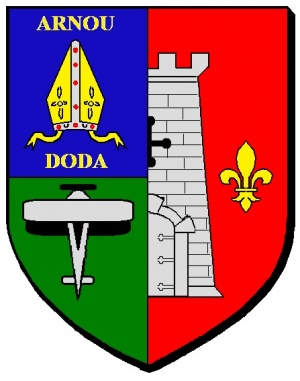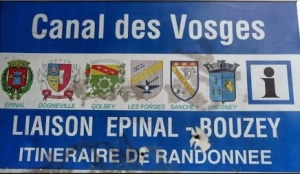Dogneville: Difference between revisions
Jump to navigation
Jump to search
Knorrepoes (talk | contribs) m (Text replacement - "{{fr1}}↵{{media}}" to "{{fr1}} {{media1}}") |
Knorrepoes (talk | contribs) m (Text replacement - "|'''English''' ↵| {{blazon wanted}}" to "|'''English''' | blazon wanted") Tags: Mobile edit Mobile web edit |
||
| Line 14: | Line 14: | ||
|- | |- | ||
|'''English''' | |'''English''' | ||
| | | blazon wanted | ||
|} | |} | ||
Revision as of 08:27, 7 April 2023
DOGNEVILLE
Département : Vosges
| French | Parti: au 1er coupé au I d'azur à la mitre avec ses fanons déployés d'or chargée d'une croix d'argent ornée de sept pierres de gueules accompagnée des inscriptions « ARNOU » en chef et « DODA » en pointe en lettres capitales d'or, au II de sinople à l'avion montant d'argent; au 2e mi-parti de gueules à la tour d'argent ajourée et maçonnée de sable, accostée de deux fleurs de lis d'or. |
| English | blazon wanted |
Origin/meaning
The mitre with the names ARNOU and DODA refers to the fact that Dognéville was the chief town of an important territory of the early medieval Kingdom of Austrasia which was ruled by Arnould, a close relative of King Clotaire II. Arnould married Doda, daughter of the Count of Boulogne, and their son Pépin d'Héristal was the great-grandfather of Charlemagne. Arnould subsequently became bishop of Metz, and Doda alone administered the, hence the name Dognéville (from Doda-ville, city of Doda).
The plane indicates the Dognéville airport. The tower and fleur-de-lys are taken from the arms of the city of Épinal.
| The arms on a sign (source) |
Literature: Image from http://www.armorialdefrance.fr

